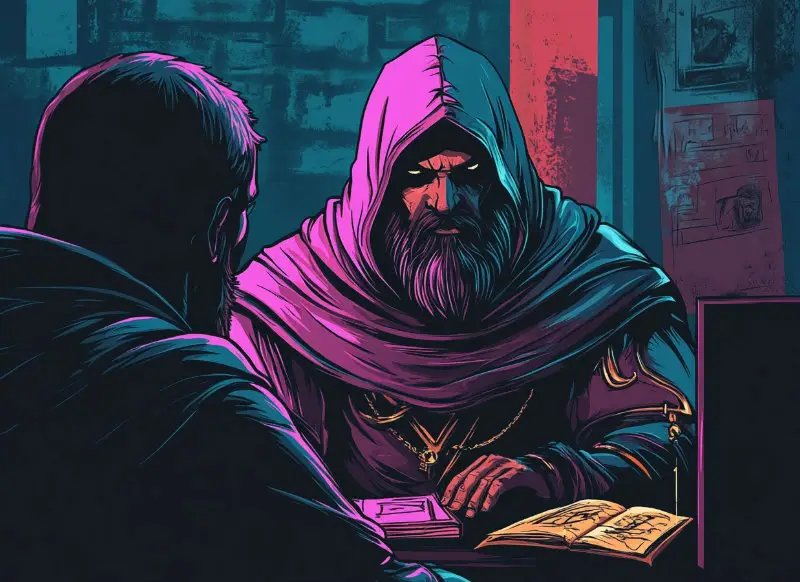
Demystifying the Role of a Game Master in TTRPGs
Being a Narrator (our word for GM) in a tabletop role-playing game often carries an air of mystery and intimidation. Many new players shy away from the role, fearing they’ll need to master every rule, anticipate every player choice, and script an intricate plot. But the truth is far simpler—and far more rewarding. At its core, being a Narrator is about facilitating a shared story and guiding players through a world of adventure, not about perfection or encyclopedic knowledge.
If you’re curious about stepping into the role of a Narrator, here’s some good news: it’s not as hard as it seems. With a bit of practice and a willingness to adapt, anyone can become a fantastic Narrator.
What Does a Narrator Actually Do?
Think of the Narrator as both a storyteller and a guide. You set the stage, describe the world, and present challenges for the players to overcome. But unlike traditional storytelling, you don’t control the narrative—you share it. The players’ choices, actions, and creativity take center stage. Your role is to react, adapt, and keep the story moving.
A common misconception is that a Narrator must have every detail meticulously planned. In reality, it’s less about having every answer and more about asking the right questions: What’s happening in the world? How will it respond to the players? The beauty of role-playing games lies in their unpredictability, and as a Narrator, you get to embrace that spontaneity.
The Myth of Perfection
Let’s get one thing straight: no Narrator is perfect. Every game session is an exercise in improvisation, and mistakes are inevitable. You might forget a rule, stumble over a description, or find yourself unprepared for an unexpected player decision. And that’s okay.
What sets a great Narrator apart isn’t perfection—it’s adaptability and reflection. After each session, take a moment to think about what worked and what didn’t. Were there moments where your players were particularly engaged? Did a plot twist fall flat? Use these reflections to refine your approach. Over time, you’ll develop a style that fits both you and your group.

Balancing Structure and Improvisation
One of the most exciting (and challenging) parts of being a Narrator is striking the balance between structure and improvisation. You’ll want enough preparation to give the players a compelling world to explore, but too much rigidity can stifle creativity.
Imagine your group is navigating a bustling fantasy marketplace:
•Over-preparing: You’ve mapped out every stall, every merchant, and every potential conflict. When the players decide to ignore the market entirely, all that work feels wasted.
•Under-preparing: You have no idea who’s in the market or what they’re selling. The players ask for details, and you scramble to invent something on the spot.
The sweet spot lies in preparation that leaves room for flexibility. Instead of planning every detail, outline broad strokes: key locations, major NPCs, and potential conflicts. This way, you’re ready to guide the players without dictating their choices.
The Joy of Shared Storytelling
Being a Narrator isn’t a solo endeavor—it’s a collaborative process. The players bring their characters to life, and their actions shape the story just as much as your descriptions do. This shared storytelling is what makes role-playing games unique.
As a Narrator, you’re not the sole author of the story. Instead, think of yourself as the world’s advocate. Your job is to ensure the world reacts authentically to the players’ actions, creating a dynamic narrative that everyone contributes to.
For example, if the players rescue a captured villager, how does the town react? Maybe the mayor throws a celebration, or perhaps the villain retaliates with greater force. These ripple effects make the world feel alive and connected to the players’ choices.
Reflection: The Narrator’s Best Tool
Improvement as a Narrator doesn’t come from memorizing rules or writing flawless plots—it comes from reflection. After each session, consider the following questions:
•What moments resonated most with the players?
•Were there any pacing issues or lulls in engagement?
•How did you handle unexpected player decisions, and could you have done so differently?
Ask your players for feedback, too. Their perspectives can shed light on areas you might overlook. By reflecting and adapting, you’ll grow more confident in your role and create increasingly memorable experiences.

Embrace the Journey
The most important thing to remember as a Narrator is to have fun. Role-playing games aren’t about winning or losing—they’re about creating, laughing, and sharing stories with friends. The joy of Narrating lies in the unexpected twists, the collaborative moments, and the connections you build at the table.
So don’t be afraid to dive in. Whether it’s your first session or your fiftieth, every game is an opportunity to grow, learn, and create something special. With a willingness to experiment and a focus on collaboration, you’ll discover that being a Narrator isn’t just manageable—it’s one of the most rewarding roles in gaming.
Closing Thoughts
If you’re on the fence about becoming a Narrator, take the leap. Start small, embrace imperfection, and trust in your ability to guide the story. Remember, every great Narrator started as a beginner. With each session, you’ll gain confidence, build skills, and create stories that linger long after the dice have stopped rolling.

